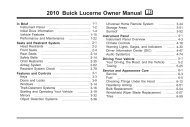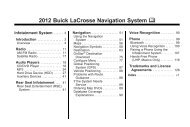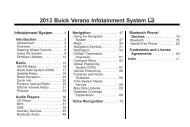- Page 1 and 2:
2009 Buick LaCrosse Owner Manual M
- Page 3 and 4:
Safety Warnings and Symbols A circl
- Page 5 and 6:
Section 1 Seats and Restraint Syste
- Page 7 and 8:
Power Lumbar Heated Seats On vehicl
- Page 9 and 10:
To return the seatback to an uprigh
- Page 11 and 12:
Center Seat Rear Seats Split Foldin
- Page 13 and 14:
{ CAUTION: It is extremely dangerou
- Page 15 and 16:
The person keeps going until stoppe
- Page 17 and 18:
Q: If I am a good driver, and I nev
- Page 19 and 20:
Q: What is wrong with this? { CAUTI
- Page 21 and 22:
Q: What is wrong with this? { CAUTI
- Page 23 and 24:
Q: What is wrong with this? { CAUTI
- Page 25 and 26:
Q: What is wrong with this? { CAUTI
- Page 27 and 28:
4. If equipped with a shoulder belt
- Page 29 and 30:
There is one guide for each outboar
- Page 31 and 32:
Safety Belt Use During Pregnancy Sa
- Page 33 and 34:
Safety Belt Extender If the safety
- Page 35 and 36:
{ CAUTION: Never do this. Never all
- Page 37 and 38:
Infants and Young Children Everyone
- Page 39 and 40:
{ CAUTION: Never do this. Children
- Page 41 and 42:
{ CAUTION: A young child’s hip bo
- Page 43 and 44:
When securing an add-on child restr
- Page 45 and 46:
{ CAUTION: A child in a child restr
- Page 47 and 48:
Some child restraints that have top
- Page 49 and 50:
{ CAUTION: Do not attach more than
- Page 51 and 52:
If the position you are using has a
- Page 53 and 54:
To remove the child restraint, unbu
- Page 55 and 56:
If the child restraint has the LATC
- Page 57 and 58:
If a child restraint has been insta
- Page 59 and 60:
{ CAUTION: Children who are up agai
- Page 61 and 62:
{ CAUTION: Driver Side shown, Passe
- Page 63 and 64:
In any particular crash, no one can
- Page 65 and 66:
In many crashes severe enough to in
- Page 67 and 68:
The passenger sensing system is des
- Page 69 and 70:
If the Off Indicator is Lit for an
- Page 71 and 72:
Adding Equipment to Your Airbag-Equ
- Page 73 and 74:
Replacing Restraint System Parts Af
- Page 75 and 76:
Section 2 Features and Controls Key
- Page 77 and 78:
The vehicle has the PASS-Key ® III
- Page 79 and 80:
(Remote Vehicle Start): For vehicle
- Page 81 and 82:
Remote Vehicle Start Your vehicle m
- Page 83 and 84:
Doors and Locks Door Locks { CAUTIO
- Page 85 and 86:
Rear Door Security Locks Rear door
- Page 87 and 88:
Emergency Trunk Release Handle Noti
- Page 89 and 90:
Power Windows { CAUTION: Leaving ch
- Page 91 and 92:
Content Theft-Deterrent Your vehicl
- Page 93 and 94:
PASS-Key ® III Electronic Immobili
- Page 95 and 96:
Starting and Operating Your Vehicle
- Page 97 and 98:
Starting the Engine Move the shift
- Page 99 and 100:
{ CAUTION: Plugging the cord into a
- Page 101 and 102:
The positions for the shift lever a
- Page 103 and 104:
Parking Brake To set the parking br
- Page 105 and 106:
Leaving the Vehicle With the Engine
- Page 107 and 108:
Parking Over Things That Burn CAUTI
- Page 109 and 110:
Mirrors Manual Rearview Mirror Hold
- Page 111 and 112:
Object Detection Systems Ultrasonic
- Page 113 and 114:
When the System Does Not Seem to Wo
- Page 115 and 116:
OnStar Hands-Free Calling OnStar Ha
- Page 117 and 118:
Universal Home Remote System The Un
- Page 119 and 120:
4. At the same time, press and hold
- Page 121 and 122:
Erasing Universal Home Remote Butto
- Page 123 and 124:
Section 3 Instrument Panel Instrume
- Page 125 and 126:
✍ NOTES 3-3
- Page 127 and 128:
The main components of the instrume
- Page 129 and 130:
Telescoping Column If the vehicle h
- Page 131 and 132:
Windshield Wipers Turn the band wit
- Page 133 and 134:
Setting Cruise Control Cruise contr
- Page 135 and 136:
Exterior Lamps The control located
- Page 137 and 138:
When it is dark enough outside, the
- Page 139 and 140:
Delayed Entry Lighting Delayed entr
- Page 141 and 142:
A high electrical load occurs when
- Page 143 and 144:
Ashtray(s) and Cigarette Lighter Th
- Page 145 and 146:
- (Defog): This mode clears the win
- Page 147 and 148:
Dual Automatic Climate Control Syst
- Page 149 and 150:
Air Delivery Mode Controls: Use the
- Page 151 and 152:
Operation Tips • Clear away any i
- Page 153 and 154:
Instrument Panel Cluster The instru
- Page 155 and 156:
This chime and light are repeated i
- Page 157 and 158:
Charging System Light This light co
- Page 159 and 160:
Traction Control System (TCS) Warni
- Page 161 and 162:
Low Coolant Warning Light Tire Pres
- Page 163 and 164:
This light comes on during a malfun
- Page 165 and 166:
This light comes on briefly while s
- Page 167 and 168:
Low Washer Fluid Warning Light Trun
- Page 169 and 170:
Low Fuel Warning Light Your vehicle
- Page 171 and 172:
(Set/Reset)*: Press this button to
- Page 173 and 174:
Fuel Menu Items (Uplevel Only) . (F
- Page 175 and 176:
Option Menu Items (Uplevel Only) 4
- Page 177 and 178:
Compass Calibration The compass can
- Page 179 and 180:
BATTERY SAVER ACTIVE This message d
- Page 181 and 182:
DELAYED LOCKING This message displa
- Page 183 and 184:
HOOD AJAR If your vehicle has the r
- Page 185 and 186:
This message displays and a chime s
- Page 187 and 188:
PARK LAMPS ON This message displays
- Page 189 and 190:
REMOTE START DISABLED If your vehic
- Page 191 and 192:
SERVICE PARK LAMPS This message dis
- Page 193 and 194:
SERVICE TRACTION SYSTEM This messag
- Page 195 and 196:
TRACTION CONTROL ACTIVE This messag
- Page 197 and 198:
To change customization and persona
- Page 199 and 200:
DELAYED LOCKING This feature allows
- Page 201 and 202:
REMOTE START If your vehicle has re
- Page 203 and 204:
AUTO UNLOCK ON This feature display
- Page 205 and 206:
Radio(s) Radio with Six-Disc CD Rad
- Page 207 and 208:
Finding a Station BAND: Press to ch
- Page 209 and 210:
Adjusting the Speakers (Balance/Fad
- Page 211 and 212:
Playing a CD Insert a CD partway in
- Page 213 and 214:
To use repeat: • To repeat playin
- Page 215 and 216:
To play the song list, press the LI
- Page 217 and 218:
Care of the CD Player Do not add an
- Page 219 and 220:
File System and Naming The song nam
- Page 221 and 222:
No Info: No artist, song title, cat
- Page 223 and 224:
Pairing a Phone 1. Press and hold b
- Page 225 and 226: 5. Say a name tag for the phone num
- Page 227 and 228: Using the Dial Command 1. Press and
- Page 229 and 230: Call Waiting Call waiting must be s
- Page 231 and 232: Sending a Number During a Call 1. P
- Page 233 and 234: x (Previous): Press to go to the pr
- Page 235 and 236: Backglass Antenna The AM-FM antenna
- Page 237 and 238: Section 4 Driving Your Vehicle Your
- Page 239 and 240: Drunk Driving { CAUTION: Drinking a
- Page 241 and 242: Antilock Brake System (ABS) This ve
- Page 243 and 244: For vehicles with the 5.3L V8 engin
- Page 245 and 246: If cruise control is being used whe
- Page 247 and 248: Off-Road Recovery The vehicle’s r
- Page 249 and 250: While driving on a surface with red
- Page 251 and 252: Before Leaving on a Long Trip To pr
- Page 253 and 254: Winter Driving Driving on Snow or I
- Page 255 and 256: Run the engine for short periods on
- Page 257 and 258: Tire and Loading Information Label
- Page 259 and 260: Example 1 Example 2 Item Descriptio
- Page 261 and 262: Never exceed the GVWR for your vehi
- Page 263 and 264: Dinghy Towing Dolly Towing Notice:
- Page 265 and 266: Pulling A Trailer Here are some imp
- Page 267 and 268: Hitches It is important to have the
- Page 269 and 270: Turn Signals When Towing a Trailer
- Page 271 and 272: Section 5 Service and Appearance Ca
- Page 273 and 274: Service For service and parts needs
- Page 275: If doing some of your own service w
- Page 279 and 280: { CAUTION: Fuel can spray out on yo
- Page 281 and 282: Hood Release To open the hood, do t
- Page 283 and 284: A. Windshield Washer Fluid Reservoi
- Page 285 and 286: A. Windshield Washer Fluid Reservoi
- Page 287 and 288: What Kind of Engine Oil to Use Look
- Page 289 and 290: How to Reset the Engine Oil Life Sy
- Page 291 and 292: 5. To reinstall the cover, position
- Page 293 and 294: Then, without shutting off the engi
- Page 295 and 296: { CAUTION: An electric engine cooli
- Page 297 and 298: Checking Coolant The vehicle must b
- Page 299 and 300: 4. Fill the radiator with the prope
- Page 301 and 302: Radiator Pressure Cap Notice: If th
- Page 303 and 304: If No Steam Is Coming From The Engi
- Page 305 and 306: How to Check Power Steering Fluid T
- Page 307 and 308: Brakes Brake Fluid The brake master
- Page 309 and 310: Brake Wear This vehicle has disc br
- Page 311 and 312: Jump Starting If your vehicle’s b
- Page 313 and 314: 5. If your vehicle has the 5.3L V8
- Page 315 and 316: 5.3L Engine 7. Connect the red posi
- Page 317 and 318: The vehicle should be: • Placed s
- Page 319 and 320: Bulb Replacement For the proper typ
- Page 321 and 322: 12. Push the taillamp assembly back
- Page 323 and 324: Windshield Replacement Your vehicle
- Page 325 and 326: Tire Sidewall Labeling Useful infor
- Page 327 and 328:
(G) TPC Spec (Tire Performance Crit
- Page 329 and 330:
Intended Outboard Sidewall: The sid
- Page 331 and 332:
Inflation - Tire Pressure Tires nee
- Page 333 and 334:
Please note that the TPMS is not a
- Page 335 and 336:
TPMS Malfunction Light and Message
- Page 337 and 338:
Tire Inspection and Rotation We rec
- Page 339 and 340:
You need new tires if any of the fo
- Page 341 and 342:
Your vehicle’s original equipment
- Page 343 and 344:
Traction - AA, A, B, C The traction
- Page 345 and 346:
Used Replacement Wheels { CAUTION:
- Page 347 and 348:
{ CAUTION: Changing a tire can be d
- Page 349 and 350:
Removing the Flat Tire and Installi
- Page 351 and 352:
{ CAUTION: Getting under a vehicle
- Page 353 and 354:
{ CAUTION: Incorrect or improperly
- Page 355 and 356:
A. Cover B. Retainer C. Compact Spa
- Page 357 and 358:
Storing a Flat or Spare Tire and To
- Page 359 and 360:
Compact Spare Tire Although the com
- Page 361 and 362:
Do not clean the vehicle using: •
- Page 363 and 364:
Care of Safety Belts Keep belts cle
- Page 365 and 366:
Exterior painted surfaces are subje
- Page 367 and 368:
Tires To clean the tires, use a sti
- Page 369 and 370:
Electrical System Add-On Electrical
- Page 371 and 372:
Fuses DR/LCK TRUNK HAZRD HTD/MIR HT
- Page 373 and 374:
J-Style Fuses Usage 25 Air Pump 26
- Page 375 and 376:
Fuses Usage INJ 1 Injectors 1 INJ 2
- Page 377 and 378:
Capacities and Specifications (cont
- Page 379 and 380:
Section 6 Maintenance Schedule Main
- Page 381 and 382:
Using the Maintenance Schedule We w
- Page 383 and 384:
Scheduled Maintenance Service Maint
- Page 385 and 386:
Maintenance Footnotes (a) Visually
- Page 387 and 388:
Engine Coolant Level Check Check th
- Page 389 and 390:
Park on a fairly steep hill, with t
- Page 391 and 392:
Maintenance Replacement Parts Repla
- Page 393 and 394:
Maintenance Record After the schedu
- Page 395 and 396:
Maintenance Record (cont’d) Date
- Page 397 and 398:
Section 7 Customer Assistance Infor
- Page 399 and 400:
STEP THREE — U.S. Owners: Both Ge
- Page 401 and 402:
Online Owner Center Online Owner Ce
- Page 403 and 404:
GM Mobility Reimbursement Program T
- Page 405 and 406:
Services Not Included in Roadside A
- Page 407 and 408:
Public Transportation or Fuel Reimb
- Page 409 and 410:
Insuring Your Vehicle Protect your
- Page 411 and 412:
Reporting Safety Defects Reporting
- Page 413 and 414:
Vehicle Data Recording and Privacy
- Page 415 and 416:
A Accessories and Modifications ...
- Page 417 and 418:
Chemical Paint Spotting ...........
- Page 419 and 420:
Electrical System (cont.) Underhood
- Page 421 and 422:
I Ignition Positions ..............
- Page 423 and 424:
Mirrors Automatic Dimming Rearview
- Page 425 and 426:
Reporting Safety Defects Canadian G
- Page 427 and 428:
Tires (cont.) If a Tire Goes Flat .






